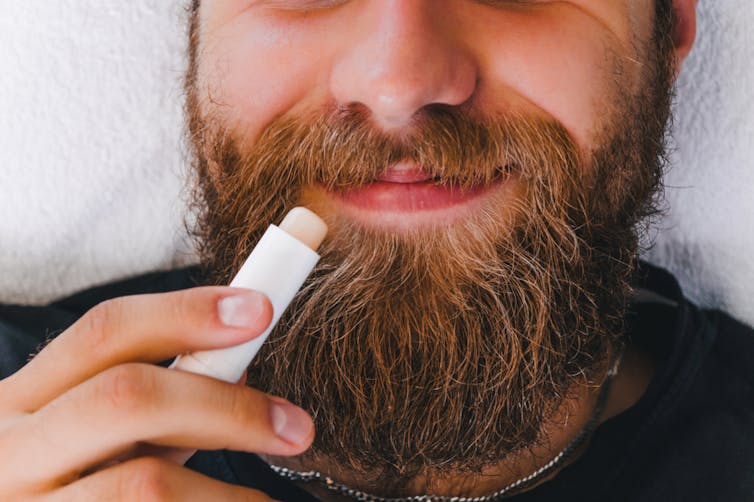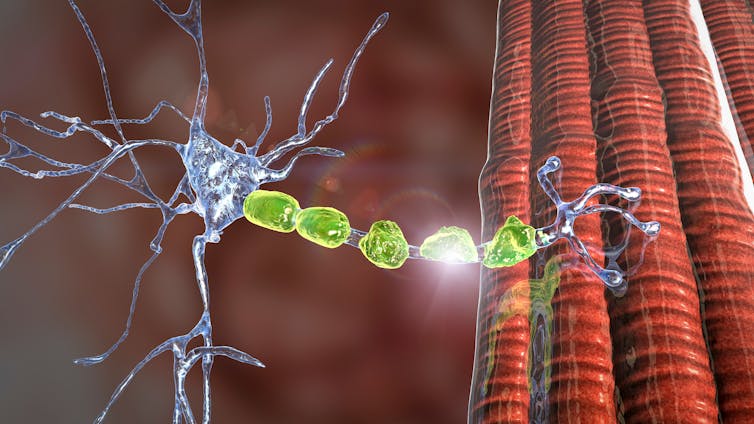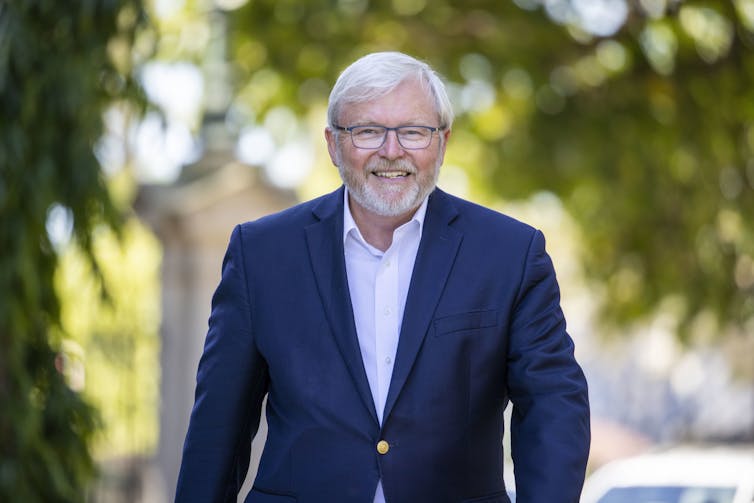
Shutterstock
Christian Moro, Bond University and Charlotte Phelps, Bond UniversityAs we head into the colder weather, many of us might be afflicted with the irritating ailment of dry and chapped lips.
People have been trying to figure out how to fix dry lips for centuries. Using beeswax, olive oil and other natural ingredients have been reported as early as Cleopatra’s time, around 40 B.C.
In 1833, there were even reports of human earwax being recommended as a successful remedy for dry, cracked lips. Not long after, the first commercial lip balms hit the market.
So what causes dry lips, and which lip balms actually help? The key is to avoid lip balms that contain certain additives which might worsen the problem.
They need to be soft but resilient
Our lips are constantly exposed to the elements, such as sunlight, wind, dry air, and cold weather. They have to withstand our daily lifestyle, including contact with food, cosmetics, biting, picking, rubbing against clothes, kissing and more.
So, although they look soft and fleshy, our lips need to be resilient and tough.
Read more:
Curious Kids: why do our toes and fingers get wrinkly in the bath?
Lips sit at the junction where our outside facial skin transitions into the tissue layers lining the mouth. As such, the lips are structured similar to mucous membranes, but with the addition of a protective outside layer of skin. Lips don’t have hair follicles, or sweat, saliva and oil glands.
This unique structure means they’re particularly prone to dryness as they have a much lower ability to hold water than the rest of the face’s skin.
What causes dry lips?
Many of us get dry lips at certain times of the year. This can occur naturally, or be brought on by many different factors, including:
- inflamed lips, known as cheilitis. This can be due to a skin condition, or an infection such as herpes or cold sores
- allergies
- medications which impact the salivary glands, the mouth’s surrounding muscles, or sensations throughout the lip area
- tongue injuries, teeth that rub against the lips, or other dental issues
- poor oral health. This can be brought on by general neglect, eating disorders, or bad oral hygiene habits
- burns, such as eating food that’s too hot, or sunburn. Burns can result in the lips swelling, scarring and blistering, and it may take a long time for the pain to alleviate
- some diseases or disorders, such as Sjögren’s syndrome
- dehydration, heat stroke, fever, or excessive heat
- nasal congestion, which leads to chronic mouth-breathing. This can sometimes be a result of illness, such as when you have a common cold
- cold weather or cold wind that runs along the lips and removes moisture
- persistent licking, which can create a wet-dry cycle that excessively dries out your lips.
The dryness can also lead to pain, itching or stinging.
If dry lips start causing serious issues, it may be helpful to discuss this with a medical professional.
How can you treat dry lips?
It is important to identify what’s causing dry lips. If it’s due to lip licking, then you need to make habitual changes to stop the practice. If it’s due to cold, windy or dry weather, then certain balms and ointments can help protect the lips.
Drinking adequate amounts of water can assist, because this helps prevent dry skin in general.
If this isn’t enough, bland, non-irritating, unflavoured lip balms can help, as they act as a film covering the lip surface, keeping moisture in.

Shutterstock
In many cases these use petroleum jelly as a base (although it’s not required), along with refined mineral oils to remove any hazardous compounds, and other ingredients that can assist in retaining and maintaining a barrier function.
In the race to appeal to consumers, cosmetic manufacturers have trialled a number of new ingredients in their lip balms. Popular lip balms often contain additives which can make the balm smell or taste nice, or soften the feel when it rubs against the lips.
Some of these extra ingredients can help. For example, if you’re out in the sun a lot, lip balm with included sunscreen is a great addition.
Products to avoid
In many cases, these compounds provide the feeling of immediate relief on the lips but don’t actually help with the barrier function. And in some cases, they can become irritants and even worsen the dryness.
When choosing a lip balm, try to avoid products containing these ingredients:
- fragrances
- flavours, such as mint, citrus, vanilla, and cinnamon
- shiny glosses, which can intensify damage from the sun’s rays
- colours, which can cause irritation and do nothing to assist the barrier function
- menthol, phenol or salicylic acid, which can actually make your lips drier
- additional, unnecessary ingredients such as camphor, lanolin, octinoxate, oxybenzone or propyl gallate.
And be sure to stop biting, picking or excessively licking your lips.
Staying hydrated and applying a bland lip balm should be a routine incorporated into your every day lifestyle for healthy, protected, and moisturised lips.
![]()
Christian Moro, Associate Professor of Science & Medicine, Bond University and Charlotte Phelps, PhD Student, Bond University
This article is republished from The Conversation under a Creative Commons license. Read the original article.






You must be logged in to post a comment.